In May 1994, a then-unknown actor called Jennifer Aniston ran into a studio set made up to look like a Manhattan coffee house, and flopped on to a sofa. She wore a white wedding dress, her hair was wet from the rain, and she had just run out on her wedding. Around her, a group of relatively unknown actors – Matt LeBlanc, David Schwimmer, Lisa Kudrow, Matthew Perry and Courteney Cox – gawped. And so began the first episode of a sitcom about six friends, written by New York City playwrights David Crane and Marta Kauffman.
Twenty-five years on, Friends is still one of the most successful television shows of all time. After it arrived on Netflix on New Year’s Day 2018, it became the most-streamed show on the internet. And, despite the fact that the final episode was broadcast in May 2004, long before the vast majority of them were born, it is the favourite TV programme of the UK’s five- to 16-year-olds.
The show’s stars are now exceedingly famous and obscenely rich. By the final series, they were each being paid $1m an episode, making Aniston, Cox and Kudrow the highest-paid female TV actors of all time.
But before Friends became a cultural phenomenon, before the “Which friend are you?” quizzes, the layered haircuts and the cries of: “We were on a break!” – and before the show became a trusted companion on hungover days spent in bed – Friends was just another television pilot being tested for NBC executives in the hope of being picked up.
May 4, 1994: the Friends pilot is filmed on the Warner Bros lot in Burbank, California. In it, five friends – Monica Geller, Phoebe Buffay, Chandler Bing, Joey Tribbiani and Monica’s brother, Ross – are hanging out at their favourite coffee house when Rachel Green runs in. Ross has just separated from his wife, Carol, who has gone off with another woman. And Rachel has just stood up her fiance, Barry, at the altar and is in need of a place to stay. By the end of the episode, Rachel has moved in with Monica and started working at the coffee house.
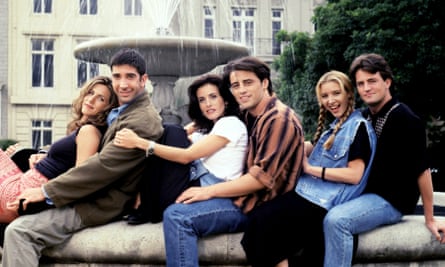
Mitchell Whitfield (Dr Barry Farber, Rachel’s orthodontist ex-fiance): It sounds a little egomaniacal to say that I’m the reason the show exists. But when you look at the pilot, with Rachel dumping me at the altar and coming in to meet everybody, that moment was the impetus for the show.
Christina Pickles (Judy Geller, Ross’s and Monica’s mother): I knew Jennifer Aniston would be a huge success from the moment I saw her in rehearsals. But I didn’t know that the show would be. I’ve done so many pilots I thought were good that didn’t work, and so many that I thought were bad that did work. I just knew I was witnessing a really special actor at work.
Mitchell Whitfield (Barry Farber): Back in the day, there used to be something called pilot season. Everyone wanted to test their pilots to see how audiences reacted to them. Actors would fly in from Chicago or New York and live in LA for the three months of pilot season, and audition every day, just hoping to get into one of those shows that would get picked up and made into a series. I got the script for Friends in the middle of the season. The second I read it, I called my agent and said: “We have to make this happen.”
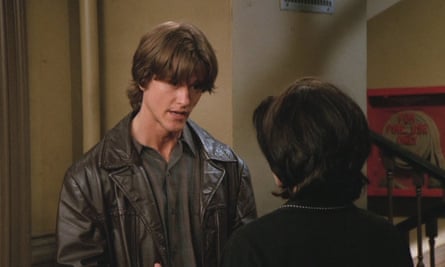
Vincent Ventresca (Fun Bobby, Monica’s on-off boyfriend in seasons one and two): I was so young and full of myself, and I’d just done a pilot for Fox’s new medical show. I thought I was the coolest person in the world. I was at home, and my agent said: “Hey, do you want to go and audition for this new show?” It was a really small part, so, of course, I’m whining like a little actor. But something inside me told me, just do it. So I went in and cried in front of Marta Kauffman, and she was like: “Great!”
Directing the pilot is James Burrows, co-creator of Cheers.
Elliott Gould (Jack Geller, Ross and Monica’s father): I wanted to work for Jim. I’d heard a lot about him: that he knew what he was doing, and he was smart. And he understood what was funny. At one point, I actually called casting because there were some people who said: “No, no, no. Friends is not enough money for you.” But I wanted to work and meet new people.
Christina Pickles (Judy Geller): Burrows was instrumental in creating the atmosphere of Friends. He took the six leads to Vegas before they started working, and they all had a good time together. That was probably very helpful in cementing a sweetness about them.
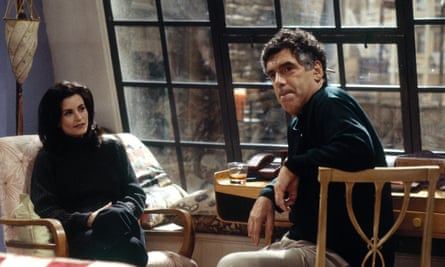
Casting for Friends takes months, and executive producers Kauffman and Crane, and fellow producer Kevin S Bright, see hundreds of hopefuls.
Mitchell Whitfield (Barry Farber): I was brought in to audition for Ross and Chandler. I went back multiple times, and then they realised Ross was the role for me. I got down to the very end, and was testing for the show. At the last minute, they said: “We’re bringing in one more guy to read.” That guy turned out to be David Schwimmer.
Jane Sibbett (Carol Willick, Ross’s ex-wife and mother of his son, Ben. She replaced the original actor, Anita Barone, who left the show after the first episode because the part wasn’t big enough): I got a phone call from my agent, saying they wanted to offer me one of the lead roles. I said to my agent: “That’s great, but you told them I was pregnant, right?” My agent said: “God, no! We’re not going to tell them that.” I insisted. Because I knew this show was going to go [and get picked up by the network], for sure.
Mike Hagerty (Mr Treeger, the building superintendent): I knew Matt Perry socially a bit, years before. When he was a kid, he used to come into the Formosa bar on Santa Monica, which was a famous Hollywood hangout. I was a patron, and we’d chat. He was a really precocious kid – but very interesting. He’d done lots of pilots already, and was on the cusp of becoming a star.
Cosimo Fusco (Paolo, Rachel’s Italian boyfriend in season one): They were all very normal. All of them had a great human side. They were very humble – and really trained. They’d spent years trying to get the right jobs.
Christina Pickles (Judy Geller): At the beginning of Friends, Matt LeBlanc was anxious. Every time he did something, he would look for approval to the director, the producers or the writers if they were around. There would be a look of: “Am I doing this right?” He ended up being amazing. He was so perfect as Joey. He slowly built that character into a wonderful, real person.
Mike Hagerty (Mr Treeger): Those kids were just ready to pop; they were all good enough to have their own shows. And the casting people somehow put them together at the time, and they were all just ready to have something wonderful happen – and it did.
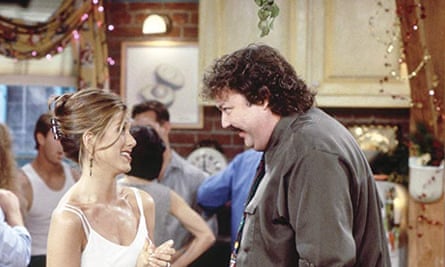
After the pilot is taped, NBC orders a further 12 episodes.
Cosimo Fusco (Paolo): When I taped my first episode, no one had seen it on TV yet. While we were filming, they announced the show had been commissioned for 12 episodes. Jennifer Aniston basically cried in my lap because nothing like that had ever happened to her before.
Larry Hankin (Mr Heckles, Monica and Rachel’s irritable downstairs neighbour): I was there before it all started. I got there early and was watching rehearsals, and the show hadn’t been on the air yet, but I remember thinking: “These young actors are really talented.”
Mitchell Whitfield (Barry Farber): There was this excitement. There was no ego on set. People had a sense of how good the project was.
Jane Sibbett (Carol Willick): My son was born on 10 September 1994. The next day, my agent called and said: “Friends has come back around again; they’ve let go of Anita Barone and would like you to take over the part tomorrow.” I said: “Wow, I’m kind of sore! I don’t think so.” But my agent said: “Jane, this is a huge offer. They’ve said they’ll go easy on you, and you can bring your nanny.” I said: “I don’t have a nanny! I’ve got my mom.” “So bring your mom!” So I sat down and nursed my son, and watched the pilot episode. And the moment I saw David Schwimmer do the longest take ever, I was hooked. I knew I had to work with him.
Vincent Ventresca (Fun Bobby): I was starstruck by David Schwimmer. Of course, the girls were incredible and you sort of fell in love with them. But David was the one I desperately wanted to like me; and he was the one most not interested in meeting anyone.
Mitchell Whitfield (Barry Farber): Towards the end of the first season, I started getting people saying: “Oh, you’re that jerk on Friends.” That’s when I thought: “This thing is definitely starting to take off.”

Friends airs on 22 September 1994. The initial critical response is lukewarm, but viewers like the show, and ratings are solid. By the end of the 1994-1995 season, Friends is the eighth most-watched show on air.
Larry Hankin (Mr Heckles): I went home, and the show didn’t air for months, so I forgot about it. And then it came out, and it was a hit.
Mike Hagerty (Mr Treeger): They weren’t stars when it all started. They were becoming very popular, and probably working on their contracts, but it wasn’t like you were walking into a room full of superstars. That came a bit later.
Vincent Ventresca (Fun Bobby): I taped the first season, and there was a comic warming up the studio audience, and the energy was good. By the time we filmed the second year, it was like a circus. I remember metal detectors. The studio was packed with people. That was around the time that the Rolling Stone cover came out with all six of them – May 1995.
Cosimo Fusco (Paolo): In season two, there was a change in everything. You’d notice it in the cars they would drive, or they’d talk about buying this or that. There was wealth coming in.
Jane Sibbett (Carol Willick): Because I was part of the early days, they weren’t so private around me. But other guest stars would complain about how they didn’t have access to this or that area. They had to clamp down on security and be much tighter about who went up into the dressing rooms, and that kind of thing.
Larry Hankin (Mr Heckles): The third or fourth time I came on set, they were No 1. [Episode 11 of the second season of Friends, The One With the Lesbian Wedding aired on 11 January 1996, and was the top-rated episode on US television with 31.6 million viewers.] Matt LeBlanc had just bought a house, and they were ecstatic. I’m not a big social person, and it was hard to crack that group. They talked to each other. Every time the camera took a break or something, the actors and producers would huddle. I’d become an outsider. There was a feeling of seeing these actors go from nowhere to being on top of the world over a period of three or four years.

Cosimo Fusco (Paolo): You know, someone’s life changes when they get a big paycheck. The money starts rolling in, and you’re obliged to spend it. They would be recognised and followed, and there would be paparazzi. It wasn’t easy for them to just have a coffee at the corner any more. But as people? They didn’t change. Not with me.
Vincent Ventresca (Fun Bobby): The first season, they had a show that was doing pretty well on the air, and it looked like they were going to do more, but they weren’t the Beatles. And then they came back the second year, and they were the Beatles.
By season three, the cast have made the decision to negotiate their contracts as a group, even though this means some members will take a pay cut. They continue negotiating as a group for the show’s entire run.
Mike Hagerty (Mr Treeger): As a group, they decided it was time to get more of a share of the profits. It was quite a risk. They were putting it all on the line.
Marlo Thomas (Sandra Green, Rachel’s mother): It’s unusual to do contracts together, and I think they set a standard for a lot of other shows to follow. When the network is negotiating against you, one at a time, things can become adversarial. But they all realised, to their benefit, that it took every single one of them to make the show that good.
Jane Sibbett (Carol Willick): I was on the lot this one time. I’d just had lunch. And I came around the corner, and I see Jen, Lisa and Courteney. It had just rained, which is a rarity in LA, right? And they’re splashing in this puddle outside the sound stage. I was so struck by it because there was no one else around, and they were just falling around laughing with one another. That was the lightning in the bottle because they captured that joy of being friends, and that playfulness, and it was magic. The love this group had for one other was extraordinary.
Christina Pickles (Judy Geller): They were a united group. They would watch each other’s work. If someone had a scene they weren’t in, the others would watch it and laugh. It’s very unusual to be so supportive of each other on set.
Paget Brewster (Kathy, Joey and then Chandler’s girlfriend in season four): They would make fun of each other. If someone made a joke and it didn’t work, they’d all turn on the person and be like: “You blew it, Lisa!” They would bust each other’s balls. And they started adding this thing into the script that they did to each other in real life: one of them would be talking, and they’d all pretend to fall asleep.
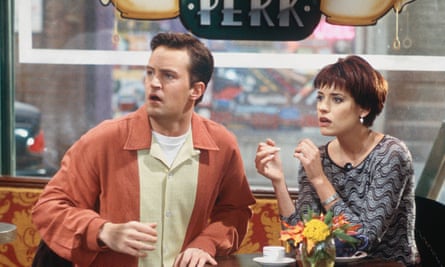
Vincent Ventresca (Fun Bobby): You’d do a pass of a scene. If the audience didn’t laugh, we’d huddle together and Matthew Perry would say: “What if we tried this?” And Matt LeBlanc would say: “Yeah!” And we’d break again and do the scene. It was like being at a football game.
Paget Brewster (Kathy): Matthew Perry always had to have the last bit. If it was the end of the scene, he would consistently pitch something. They’d make fun of him for literally always wanting to have the last laugh.
Christina Pickles (Judy Geller): Everything begins and ends with the writing. David and Marta didn’t write every show – they hired a lot of good writers – but they had the final say, and they had impeccable taste.
Alexandra Holden (Elizabeth Stevens, Ross’s girlfriend in season six. She was one of his students, and Bruce Willis played her father): We’re in the cabin in one episode, and Ross and I are making out on the couch. He says: “I can’t stop thinking about your dad.” The writers stopped and said: “After he says that, why don’t you say: ‘Whatever works for you?’” We added the joke in at the last minute, and it was so funny. They could just come up with stuff like that on the spot.
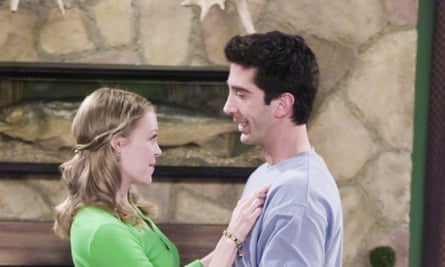
Christina Pickles (Judy Geller): David and Marta would come down from the office to watch the run-throughs, which was terrifying. They’d sit in a row of chairs, with the writers and NBC executives. And you could see they were thinking, and they’d give comments and then go back upstairs and change it all. David and Marta were the giant stars of the writing team.
Jane Sibbett (Carol Willick): There was one joke we kept changing. We couldn’t get it right. It was the episode where Susan and I are celebrating our anniversary, and Ross comes over at an inopportune moment, and I had to telegraph to him that it isn’t a good time. So I removed a little pube from my tongue. That was the only time I pitched something that was really outrageous, and it actually got on air.
With Friends’ increased popularity comes intense media scrutiny. But on set it’s business as usual.
Aisha Tyler (Dr Charlie Wheeler, Joey and then Ross’s girlfriend): I remember walking into Monica’s apartment, and looking out of the window to see if I could see Ugly Naked Guy, but of course it’s just a hallway back there.
Paget Brewster (Kathy): I was terrified of those guys. I hid in my room because they were so famous. It was the biggest show in the country.
Aisha Tyler (Dr Charlie Wheeler): It was a very intimidating set to walk into. I think the cast had had some pretty notable experiences with guest actors coming in and struggling because of the pressure of having to be funny on the Friends set.
Marlo Thomas (Sandra Green): It’s not always easy to walk into a show that has already been established and where everyone has their characters, and they’re a tight-knit family. Sometimes, it’s not roomy enough for a new person to come in. But they made it very roomy.
Alexandra Holden (Elizabeth Stevens): I got called in to do a “chemistry read” with David Schwimmer. It was terrifying because the producers told me to come in looking “as hot as possible”. I didn’t know what to do with that information. It sent me into a tailspin. I stayed up all night trying to figure out what to wear … Now that I’m older, I wouldn’t be happy getting that message.
Elliott Gould (Jack Geller): We did the scenes for the episode in London, with the wedding [between Ross and Emily in season four]. I was doing something else back in the US, and there was a cliffhanger. And I very foolishly gave the cliffhanger away. Some of the producers were really angry at me.
Jane Sibbett (Carol Willick): It was important to us, and the producers, that we showed a couple that was in love. But certain affiliates wouldn’t air the episode with our [Carol and Susan’s] wedding. They completely blocked it out.
By the time Friends wraps its final season in 2004, the lead actors have become some of the highest-paid TV stars of all time, earning $1m an episode.
Mitchell Whitfield (Dr Barry Farber): My wife, she cringes a little bit because if I had ended up getting the part of Ross, I’d have made tens of millions of dollars. But I never think about that.
Vincent Ventresca (Fun Bobby): Every time I get a cheque [for residuals, from reruns of the show] I think to myself: “Wow, they [the main cast members] must be really rich.” I get about $2,000 a year in residuals, and I only did two episodes.
Jane Sibbett (Carol Willick): I’m quite content. Obviously, I didn’t get paid the million-dollar paycheck, but I’ve had the best of Friends. I was able to raise my children and I got offered some really sweet projects.
Cosimo Fusco (Paolo): I have a little bit of regret; I feel like I could have capitalised more on the success of the show. I was having a divorce, and was distracted by my personal life. I didn’t get a publicist, which I should have done.
Mike Hagerty (Mr Treeger): People have a tendency to pigeonhole you a little bit, but it’s always good to have something that people can recognise you from.
Vincent Ventresca (Fun Bobby): I got offers right away … It did kind of throw me, ego-wise. I started thinking I was really cool, and nothing was good enough for me. I always admired how gracefully they [the main cast members] handled it. Because I only had a little taste of it and I could barely handle it. Friends did help my career. But I don’t think I let it help my career as much as it could have done.

In the two and a half decades since Friends first aired, the show has been continually rerun. In recent years, critics have re-evaluated the show’s legacy, identifying problematic storylines and criticising Friends for its lack of diversity.
Aisha Tyer (Dr Charlie Wheeler): People of colour were always aware of it [the lack of diversity]. Even at the time, people were constantly pointing out that Friends wasn’t as diverse as the Manhattan of the real world.
Cosimo Fusco (Paolo): Today, one of the six would have to be black, of course.
Aisha Tyler (Dr Charlie Wheeler): My character wasn’t written on the page to be a woman of colour, and I auditioned against a lot of other women of different ethnic backgrounds, so I like to think they picked me because I was the right person for the role. But I knew it was something new for the show, and it was really important because, the fact of the matter was, it was a show set in Manhattan that was almost entirely Caucasian. It was an unrealistic representation of what the real world looked like.
Cosimo Fusco (Paolo): There was one scene where I was getting a massage, and I had to be this greasy guy who was touching Phoebe’s ass. I had a problem with how it portrayed me, as if guys from Italy are like that. What they wanted me to do was quite disrespectful. But I remember we were able to find a compromise, so I felt comfortable.
Paget Brewster (Kathy): It’s so bizarre to compare the show at that time to what’s happening now on social media. No one can do anything right, ever. That’s basically where we are. Everything is people being questioned or attacked. Yeah, if you look at the world today, and you look at Friends, you go: “Oh, wow, there were gay jokes and they don’t have friends of colour.” But that’s what it was then.
In 2018, Netflix acquired the rights to Friends in a $100m deal. Thanks to streaming, the show has become known to a new, younger audience.
Vincent Ventresca (Fun Bobby): As an actor, you want to be a part of something: your work will be here when you’re gone. And you get an insight into that when a show that is 25 years old gets reissued on Netflix, and a whole new audience discovers it.
Alexandra Holden (Elizabeth Stevens): My 12-year-old niece just asked me for a T-shirt with “Central Perk” on it. That’s so bizarre to me. She wasn’t even alive when I worked on the show.
Christina Pickles (Judy Geller): Kids come up to me and recite the script.
Paget Brewster (Kathy): People in their 20s recognise my voice. They turn around in supermarkets and say: “You’re Kathy!”
Mitchell Whitfield (Dr Barry Farber): “Dude, what was it like? You got to kiss Jennifer Aniston!”
Elliott Gould (Jack Geller): I met Taylor Swift, and she said: “I know you! I’m a Friends freak! You’re Mr Geller.”
Cosimo Fusco (Paolo): I can work in the most exquisite film, but the minute people find out I was Paolo, they’re like: “Oh my God!”
Now, 25 years since the show first aired, Friends is the most-streamed show in the UK, and perhaps even the most beloved TV show of all time.
Paget Brewster (Kathy): A show like Friends was one in a million. Normally a pilot doesn’t go, or it goes and you shoot three episodes, or you make a year and it’s gone.
Aisha Tyler (Dr Charlie Wheeler): There have been other shows that have advanced that concept of friends as chosen family, but Friends was just a perfect encapsulation of that idea.
Marlo Thomas (Sandra Green): They’re independent, their parents aren’t telling them what to do, they’re making their own decisions, they’re making their own mistakes – and they’re succeeding at it! That’s aspirational for young people to see.
Alexandra Holden (Elizabeth Stevens): Television was a very different thing back then. I don’t know if there will ever be another show as successful as Friends. I feel like there’s too much content out there now, and too much variety.
Vincent Ventresca (Fun Bobby): I was so young. I was 27. I don’t remember feeling young then, but now it’s like looking back in time. But I love looking back at it. It’s a good memory, and it’s a reminder that time is passing. Not a lot of people get to look at where they were half their lifetime ago.
Alexandra Holden (Elizabeth Stevens): It feels like a different life. When I watch Friends now, I think: “Was I really there? Did that really happen? Was I really part of this thing that’s become such a huge influence all these years later?” It’s kind of surreal.
Marlo Thomas (Sandra Green): Everything you do is part of the tapestry of your career, and your life. Every little thread gets pulled in some way. And the Sandra Green thread is certainly a colour in my tapestry that people remember and have some affection for, as do I.
Vincent Ventresca (Fun Bobby): When someone comes up to you and says: “Hey, you were good on Friends,” it connects you with them in a way. You were part of a thing that meant something to them, and that means something to me. It makes you feel like: “Maybe you didn’t really waste your life.”
Elliott Gould (Jack Geller): I saw Matt LeBlanc at the studio recently, and we embraced. Without being pretentious, we’re all a part of each other.
Vincent Ventresca (Fun Bobby): Things don’t change as much as you think they do. What’s important to us: friendship, family, community and laughing at silly situations. That’s what Friends is all about. And that’s timeless.
Comments (…)
Sign in or create your Guardian account to join the discussion